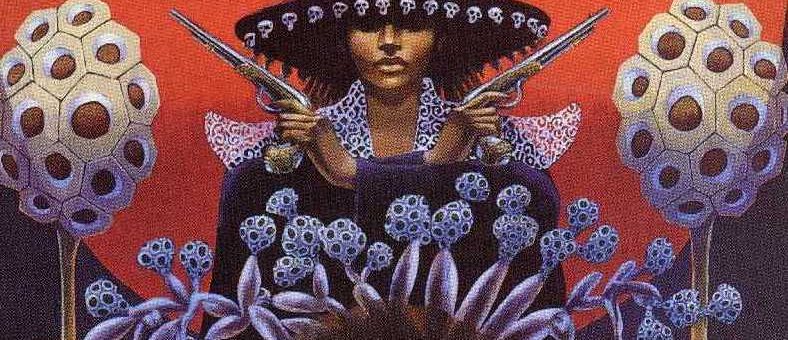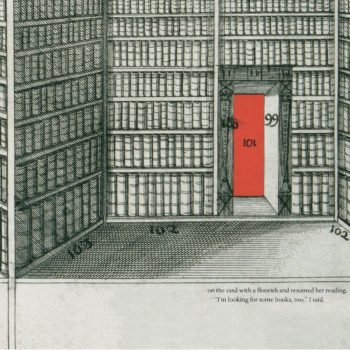
Experiencing Afrofuturism as a Black Canadian
- Posted by Augur Blog
- On February 21, 2019
- 0 Comments
- afrofuturism, CanLit
By Terese Mason Pierre
I’m a young black woman. I write speculative fiction.
It took me far too long to discover the existence of black women speculative fiction writers. I assumed it was something white people did, and that I, writing speculative fiction, was doing something white people do. It wasn’t the first time I thought this.
I went to the University of Toronto. I have a Master’s degree in philosophy. For a while, I was really into dubstep. Doing “white things” was normal for me. It was so normal that I started to distance myself from my blackness. When I discovered (in December 2016) that Octavia E. Butler’s fiction existed, it took a long time to overcome the shame and anger associated with the marriage of my blackness and my creative speculative fiction writing. (I wrote about it here.) Now as a 23-year-old, I’m actively beginning to reclaim and celebrate those parts of my identity, together.
Black Panther and the rise of Afrofuturism was exciting to behold. Blackness in speculative fiction was gaining normality. Writers like N. K. Jemisin were being celebrated. As I watched this unfold from Canada, I started to participate more in the Canadian literary scene.
In Toronto, where I have spent more than half of my life, I started attending poetry readings, book launches, and writer meet-ups. I became acquainted with acclaimed authors, and worked with my peers and contemporaries to better my work. It was during this period when I gained a deep pride in my Canadian identity.
I started to set my stories in Toronto, my characters used Toronto slang—doing my part to shift the focus of CanLit from the snow,prairies, lobsters, and metaphoric storms to city environments, people of color, and diverse futures. I have always been one to consolidate as many of my interests as I can, so I naturally looked for ways I could celebrate black speculative fiction and Canada, specifically.
While there is a substantial community for Canadian speculative fiction, and groups that focus on Black Canadians, I rarely saw the two intersect. Nalo Hopkinson is the most prominent black female Canadian speculative fiction writer. Her book, Brown Girl in the Ring, a dystopia that blends Caribbean magic with Toronto urbanness, was the first black speculative fiction book I read. I identified so strongly with the main character, Ti-Jeanne. Like me, she was black Caribbean, lived in Toronto, and was navigating her identity. I wanted more.
I could easily look to the U.S. to see black and African-American authors taking strides to share their ancestry through writing, by imagining new worlds and futures. And that was excellent—really and truly. But I wasn’t American. And I wasn’t African (not in the recent generations, at least). Where was I supposed to turn?
I wanted to write black speculative fiction more than ever. Specifically, I wanted to write black speculative fiction that directly connected to my Caribbean ancestry and Caribbean cultures, in the way that Black Panther reflected various African cultures, or the way that Nalo Hopkinson’s characters used obeah. But to do this, I needed to learn more about my these identity within me. This was good, yes? It was what I wanted to do all along.
But, surprisingly, this only brought stress. I felt I needed to find pride in being Grenadian as much as I found pride in being Canadian. But I didn’t know much about the Caribbean, only spent a year in Grenada as a child, and even then, I was the outsider, the Canadian. I talked weird, I read strange books, wasn’t as outgoing as the other children.
I thought I had to write that kind of ancestry-culture-infused literature for it to be “legitimate” black speculative fiction, for it to count in the realm of Afrofuturism. Like Nnedi Okorafor, Tomi Adeyemi and Nalo Hopkinson, I felt I needed to draw upon my specific heritage—one I already knew little about— in order to write properly.
Here, however, another thought occurred to me. Why couldn’t I just write speculative fiction about black people living in Canada, the way I was black and living in Canada? Didn’t that count? Why couldn’t I separate—not consolidate—the interests of wanting to learn more about my Grenadian heritage and blackness and writing black Canadian speculative fiction? It was okay (at least for now) that I didn’t know much about Grenada. I loved writing speculative fiction, I loved Canadian literature, and that was that.
So that’s what I’m doing. I go to literary events, I go to black writing events, I find other young black Canadian speculative fiction writers and I raise them up. Maybe someone’s writing a short story about a TTC system that’s efficient (truly a fantasy), or a novel about UofT’s Black Student Association being the most powerful sorcerers on campus. (Did they perfect teleporting so folks can get from Earth Sciences to Alumni Hall on time?) I look up black Canadian speculative fiction writers and add their books to my readings lists.
I also aim to write more, to actively research more. I don’t want other young black people – now and in the future—to experience the anger and shame I did at not knowing there were other writers who looked like them, and thinking their ignorance was their fault. I want the Canadian science fiction and fantasy circles to see more black writers in their midst, publishing books and short stories (and also academic work on science fiction and fantasy). I want black writers to be confident, to find communities, to be supported, to excel.
I’m a young black woman. I write speculative fiction. And it’s okay to be proud of that.
IN CASE YOU MISSED IT…
If you love dragons and science, you are going to love our review of the Lady Trent series.




0 Comments